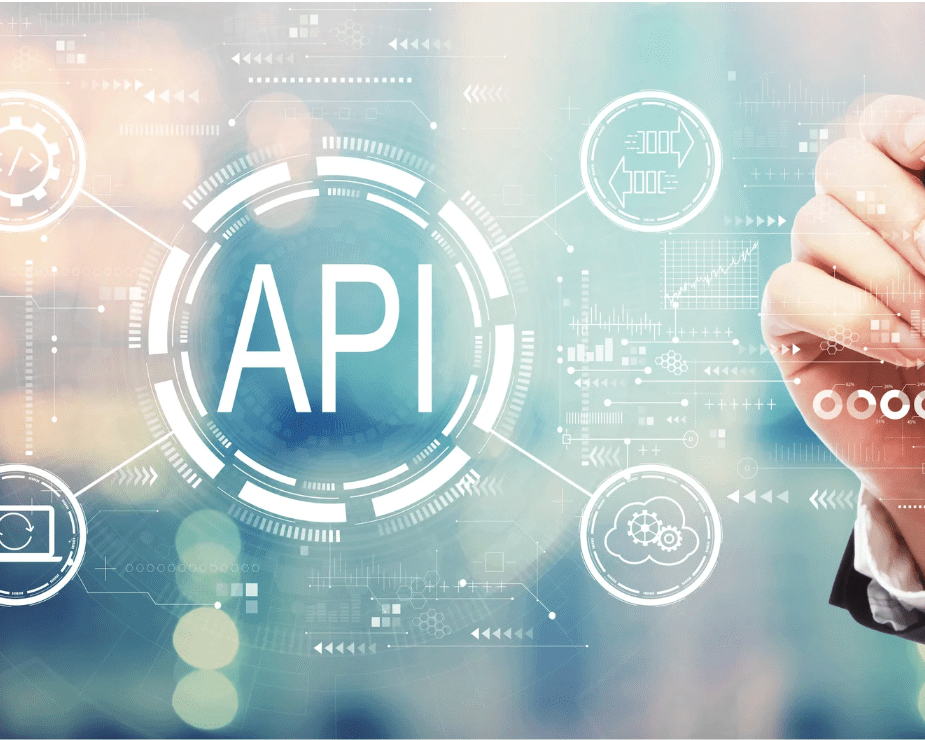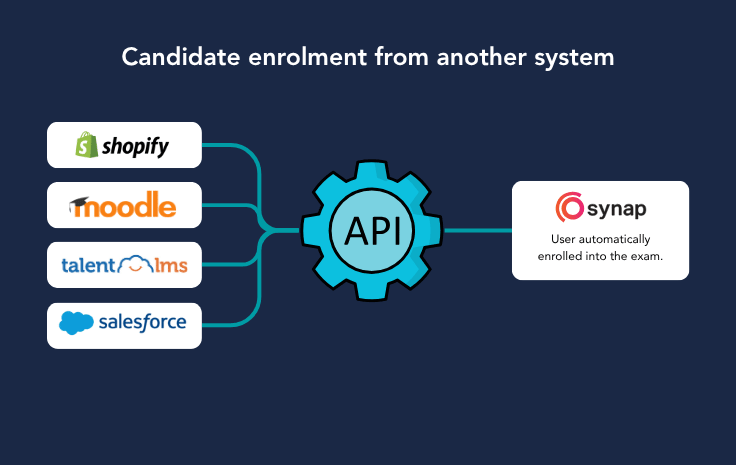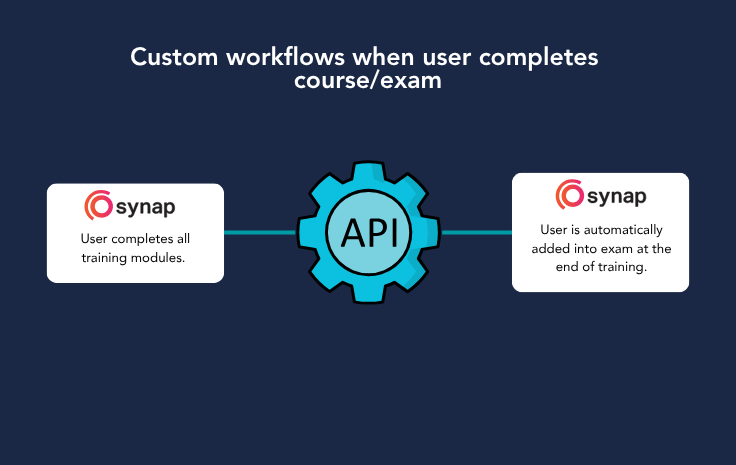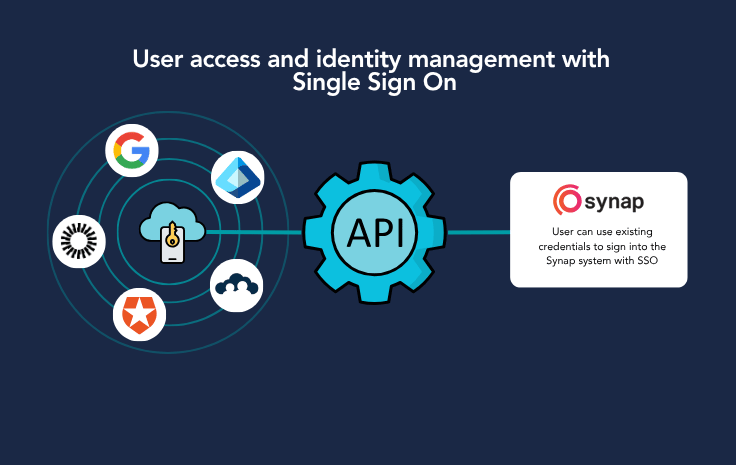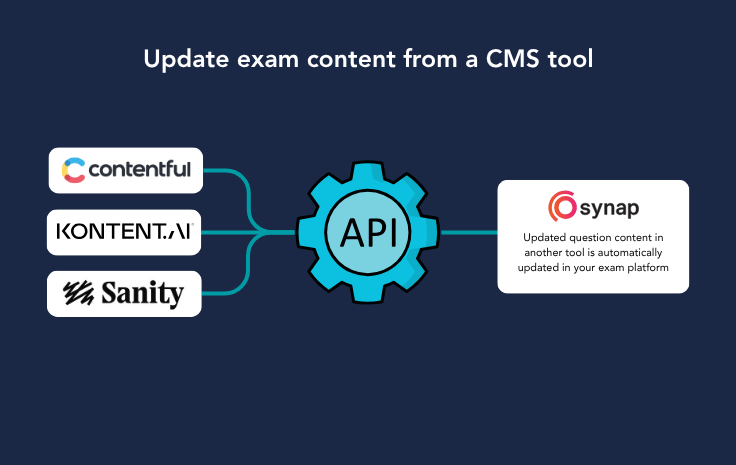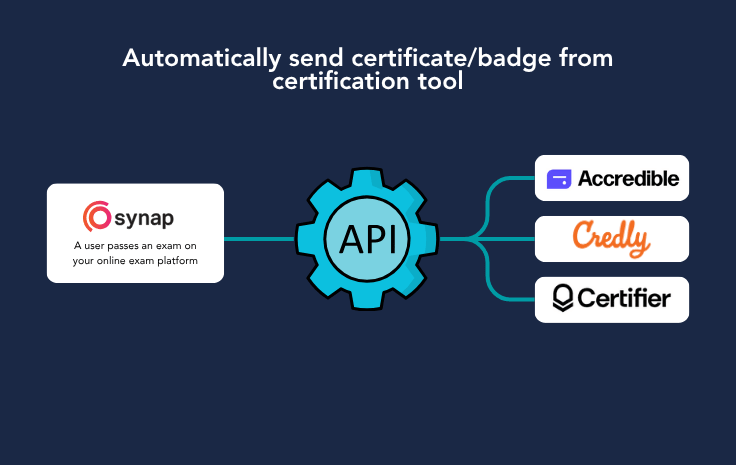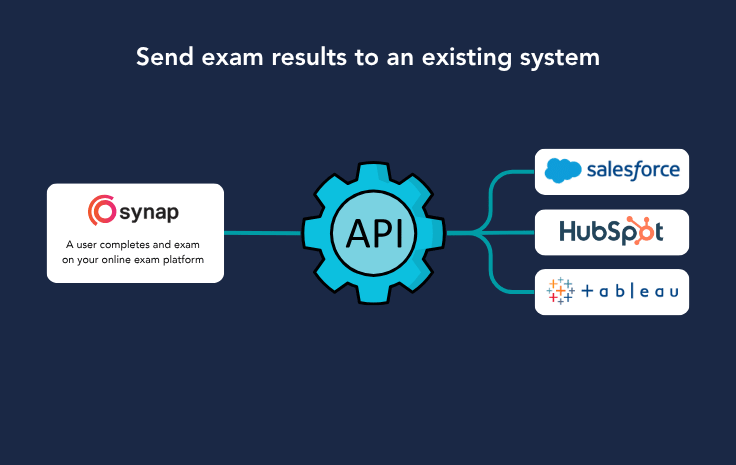APIs (Application Programming Interfaces) play a vital role in modern exam delivery platforms. They offer scalable and intelligent ways to automate admin-heavy workflows, enhance user experiences, and integrate seamlessly with existing systems such as CRMs, LMS’s, databases and more. For B2B organisations delivering exams to learners, employees, or customers, API integration can transform siloed tasks into a connected, streamlined workflow. In this post, we explore why APIs matter and the top real-world use cases for APIs in online assessments.
What is an API and the benefits for online exams?
APIs are a bridge that connect your exam platform to other systems your organisation may already use or want to use, such as HR tools, LMSs, CRMs, or eCommerce platforms. APIs allow these different software applications to communicate, share data and define how one application can request and receive data or functionality from another. Here’s why you should consider leveraging APIs in your exam strategy:
Reduce manual processes with efficient automation
APIs eliminate repetitive manual processes by enabling systems to “talk” to each other. Instead of having administrators manually enrol candidates, update records, or send certificates, these tasks can be triggered automatically based on specific actions — such as a course completion, a payment confirmation, or a role change in an HR system.
Improve accuracy and reduce human error
Manual data entry is prone to human error e.g incorrect email addresses, mismatched candidate IDs, or outdated job titles, which can cause confusion and delays. By integrating systems via APIs, you ensure that data flows directly between platforms without the need for duplication. This creates a single source of truth across your systems. When a user’s information is updated in your HR system, for example, it’s reflected instantly in the exam platform, keeping records consistent, clean, and reliable. This is especially critical in compliance-heavy industries or regulated training environments.
Eliminate delays for users by providing instant access
Real-time access isn’t a nice-to-have anymore, it has become the standard. APIs make it possible to grant instant access to exam content, learning materials, or credentials the moment a required action is taken — such as completing a course, submitting an application, or making a payment.
Unlock seamless exam delivery through headless architecture
A headless system is a type of setup that runs without a built-in user interface, think of it like a server that works quietly in the background, doing all the important tasks but not showing anything directly to users. Instead, it connects to other systems or applications that handle how everything looks and feels to the end user. For online exams, a headless exam platform means the backend is separate from the frontend. The backend handles all the data, exam logic, and processes, while the frontend is what learners see and interact with. APIs act as the bridge between the two. This setup is ideal for businesses that want a custom user experience without giving up the power and control of a robust, centralised exam platform.
Top use cases for using APIs in online exam delivery
Let’s explore some of the most powerful and practical ways that organisations are using APIs to streamline exam delivery, reduce admin time, and create seamless, connected assessment experiences , all while improving scalability and user experience.
Streamline candidate enrolment for faster exam access
1. Candidate enrolment via HR, LMS, or eCommerce Tools
Automate exam enrolment by integrating with your existing platforms, such as Workday, Salesforce, Moodle, TalentLMS, or Shopify. When a specific trigger happens - for example, a candidate is hired and completes a course or purchases an exam, they can be instantly enrolled into an exam without any manual input.
Example journey: A learner buys an exam bundle via Shopify → API automatically enrols them into the correct exam → Candidate receives email confirmation and login credentials instantly.
2. Integrate with payment gateways for pay-per-use models
Use APIs to integrate with payment gateways, such as Stripe, to allow candidates or corporate clients to pay per exam, seat, or cohort — and receive immediate access once payment is completed.
Example journey: A client pays for 50 exam seats via Stripe → API adds 50 seats to their account and generates enrolment links → They can assign access immediately meaning candidates don’t need to wait.
3. Enable paid retakes via eCommerce integration
Monetise retakes and improve the user experience while also removing manual intervention. Offer candidates the ability to purchase retakes through your eCommerce platform, the API triggers re-enrolment, giving them instant access to the retake exam once they have paid.
Example journey: A candidate fails an exam → They're directed to your Shopify store → Once payment is made, the API triggers re-enrolment into a retake exam → They receive access and instructions instantly.
4. Dynamic exam unlocking based on behaviour or role
Unlock exams dynamically when certain conditions are met — such as achieving a minimum score in a prerequisite test, having a particular job title, or completing mandatory training.
Example journey: A learner passes a prerequisite test with 80% → API unlocks the next level exam → The learner is notified and gains access immediately.
5. Multi-tenant management for partners or resellers
APIs can automatically create new, separate spaces or accounts for different clients, partners, or resellers whenever needed—without any manual setup. This means each group gets their own customised environment with their branding and settings, ready to use right away.
Example journey: A new partner signs a licensing agreement → API provisions a separate tenant on the platform with their branding → Their admins receive credentials and setup instructions.
Ensure secure, accurate user access and identity management
6. Manage user access based on group rules
APIs can automatically move users between groups based on role, location, or progression, helping you easily control access to exams and content. For example, shifting a candidate from ‘Pre-exam Training’ to ‘Exam Ready’ once they complete a course. This is particularly useful in enterprise environments where user access needs to be tightly controlled and updated regularly.
Example journey: A candidate completes all their training modules → The API moves them from the ‘Training’ group to the ‘Exam Ready’ group → They now have access to their final exam.
7. Update custom candidate attributes
Sync custom fields such as ID numbers, job titles, or organisation names from your internal HR or CRM system to the exam platform. This keeps candidate records up to date across platforms without duplication.
Example journey: A job title is updated in SAP SuccessFactors → API syncs it to the exam platform → Candidate profile is instantly updated.
8. Sync accessibility preferences
Sync user accessibility needs (e.g. extra time, screen reader compatibility, font size) from a user profile in your LMS or HR system to the exam platform to ensure inclusive delivery.
Example journey: A learner is flagged in the LMS as needing extended time → API updates the exam platform settings → The candidate receives 25% extra time automatically.
9. Integrate with Single Sign-On (SSO) and identity providers
Use APIs to authenticate users via identity platforms such as Okta, Azure AD, or Google Workspace, ensuring seamless and secure login without separate credentials.
Example journey: A candidate logs into your LMS via Okta SSO → Candidate accesses the Synap exam platform → API validates and logs them into the exam platform with no additional password required.
Deliver engaging assessments with up-to-date content
10. Update exam content from a CMS
Keep your exam questions fresh and relevant by syncing your exam platform with a content management system like Kontent.ai, Contentful, or Sanity. Updates to your content can be reflected automatically in your exams. This helps you maintain consistency across learning and assessment without needing to duplicate work in multiple systems.
Example journey: An editor updates a question set in Kontent.ai → The API syncs the changes with the exam platform → Learners instantly see the updated content the next time they take the exam.
11. Manage quality assurance of questions
APIs can be used to support a structured question review process by logging issues flagged by candidates. This allows your team to monitor content performance, review problematic questions, and make data-informed improvements over time. This helps you maintain high content quality and a fair testing experience for all candidates.
Example journey: A candidate flags a confusing or incorrect question during their exam → The API logs the flag in your QA dashboard or issue-tracking tool → Your content team reviews the feedback and updates the item accordingly.
12. Be informed when there is a proctoring breach
Integrate with remote proctoring tools to receive real-time alerts when suspicious activity is detected, such as looking away from the screen or navigating away from the exam window. APIs can push these events to your internal systems for swift action. This enables quicker responses and safeguards the integrity of your exam process.
Example journey: A proctoring tool detects potential misconduct (e.g. use of unauthorised devices) → An API sends an alert to your admin dashboard or security platform → The case is flagged for review and appropriate action is taken.
13. Trigger plagiarism or integrity checks
Submit written responses via API to tools like Turnitin or Plagiarism Checker to ensure originality before final grading. Results can be sent back and flagged in your platform.
Example journey: A candidate uploads a long-form answer → API sends the response to Turnitin → The score is returned and added to the candidate's record with any red flags.
Accelerate marking and instantly issue certifications
14. Automated issuance of certificates and badges
Connect an exam platform with digital credential platforms like Credly or Accredible to issue certificates or badges automatically once a learner passes an exam. This can save valuable admin time and means users get instant access to their certification. If you prefer to send printed certificates, you can use an API to send the data to your fulfilment provider.
Example journey: A learner passes an exam → The platform sends a success signal via API → A certificate is generated through Accredible or Credly, and emailed to the candidate.
15. Marking management
Track the progress of manual marking or build a fully custom marking workflow, whether managed by your internal team or supported by AI. This approach gives you flexibility in how and where marking takes place, while maintaining visibility and control at every stage.
Example journey: A candidate submits a written response → API sets the exam status to “Awaiting Marking” in your internal system → An assessor (or AI engine) marks the response and updates the status → The final grade is pushed back to the exam platform automatically
16. Auto-assign assessors or reviewers based on rules
Automatically assign specific assessors to review subjective responses (e.g. essays or video submissions) based on workload, subject area, or availability.
Example journey: A candidate submits a written response → API checks availability and assigns to an assessor with expertise in the topic → The assessor is notified via email or dashboard.
Provide real-time insights through reporting and analytics
17. Sending exam results to CRMs, Databases, or BI Tools
Keep all your data in one place by using APIs to export exam results directly to tools like Salesforce, HubSpot, Snowflake, or Power BI. This also enables sales teams, L&D departments, or business leaders to get real-time visibility on candidate performance and progress.
Example journey: A candidate completes an exam → Results are sent automatically to Salesforce → The sales team sees who’s passed and can follow up with next steps or certification offers.
18. Update live reporting dashboards or spreadsheets
Use APIs to feed data into custom dashboards or spreadsheets - such as Google Sheets, Excel Online, or Airtable - for real-time tracking of exam performance. This is particularly useful for team leaders, regulators, or clients who require tailored reports broken down by region, cohort, or exam section.
Example journey: A candidate completes an exam → API sends data to a shared Google Sheet → The sheet displays candidate name, exam scores, pass/fail status, and breakdown by section → Stakeholders access the latest results instantly.
19. Trigger survey feedback after exam completion
APIs can automatically trigger survey tools like Typeform, SurveyMonkey, or Google Forms after an exam, gathering feedback to improve the assessment process or candidate experience.
Example journey: A candidate finishes an exam → API triggers a post-exam survey via SurveyMonkey → Results are collated and fed back to your L&D team.
Enhance communication with timely notifications and alerts
20. Send custom notifications and alerts
Use APIs to trigger notifications based on user actions. For example, send Slack messages to trainers when a cohort completes an exam, keeping everyone informed automatically. You can also send personalised email reminders to candidates who haven’t started their assessments.
Example journey: A candidate hasn’t started their exam three days before the deadline → The platform triggers an email reminder and a Slack alert to the trainer → Both parties are notified and can take action.
21. Send automated emails to candidates based on logic
Trigger custom emails via SendGrid, Mailchimp, or your own mail servers based on exam activity or status. This enables you to remind candidates to take action, such as sitting an exam or booking a slot, or to congratulate them after passing.
Example journey: A candidate hasn’t started their exam 48 hours before the deadline → API triggers an automated email reminder with support links → The candidate takes action without needing manual follow-up.
22. Send dynamic offers or next steps after exam completion
APIs can trigger marketing automation flows that send targeted offers, invitations to next-level certifications, or personalised learning recommendations based on exam outcomes.
Example journey: A candidate scores over 90% on an advanced course → API triggers an email campaign offering a premium certification bundle → Candidate receives the offer within minutes.
Drive learner progress with personalised learning pathways
23. Orchestrate learning journeys
APIs allow you to build structured, personalised learning pathways where each step, from course completion to assessment and certification, is connected. This reduces admin, keeps learners engaged, and ensures the right content is delivered at the right time in their journey.
Example journey: A learner completes a training module in Moodle → API schedules their corresponding exam and unlocks access → Once the exam is passed, the next learning module or certification step is automatically triggered.
24. Trigger escalation workflows for at-risk candidates
Identify candidates who fail multiple times, don’t show up, or score poorly, then use APIs to trigger escalation processes (e.g. schedule coaching sessions, notify a mentor).
Example journey: A learner fails two attempts in a row → API flags them and notifies the L&D lead → A 1:1 support session is automatically scheduled.
Resolve support issues swiftly to maintain exam integrity
25. Trigger support tickets or chatbot flows
Automatically raise tickets in platforms like Zendesk, Intercom, or Freshdesk when certain events occur (e.g. a candidate fails three times or reports a technical issue). You could also trigger chatbot flows based on API events to offer instant self-service support.
Example journey: A candidate encounters an error during their exam → API logs the issue and creates a Zendesk ticket → Support is notified immediately and can reach out or resolve it proactively.
Transform your exam delivery - faster, smarter, and seamless with API integration
APIs are an essential part of delivering efficient, scalable, and user-friendly online exam experiences. From automating enrolments and syncing user data to triggering real-time notifications and streamlining content management, APIs give you the power to connect your exam platform with the tools your organisation already uses. Whether you’re an enterprise managing thousands of candidates or a growing training provider looking to scale, API integrations can reduce administrative burden, improve accuracy, and create seamless learning and assessment journeys for your users. Ready to see how this could work for you organisation? Book a demo to explore the possibilities and start your 14-day free trial to see how APIs can transform the way you deliver exams.
